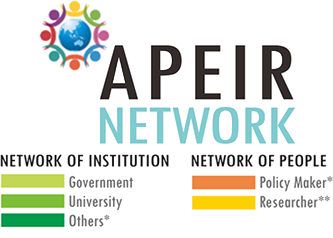The Asia Partnership on Emerging Infectious Disease Research (APEIR) is a research network composed of researchers,
practitioners and senior governments officials from Cambodia, China, Lao PDR, Indonesia, Thailand and Vietnam.

*Include hospital, practitioner / field association and foundation, research network, non government research institution
* Those who work for a government institution and has authority for policy making / administrative authority to create policy
** Those who work for a university, government owned research institution or NGO for researching data / making report and has no administrative authority for the government

*Include hospital, practitioner / field association and foundation, research network, non government research institution
* Those who work for a government institution and has authority for policy making / administrative authority to create policy
** Those who work for a university, government owned research institution or NGO for researching data / making report and has no administrative authority for the government